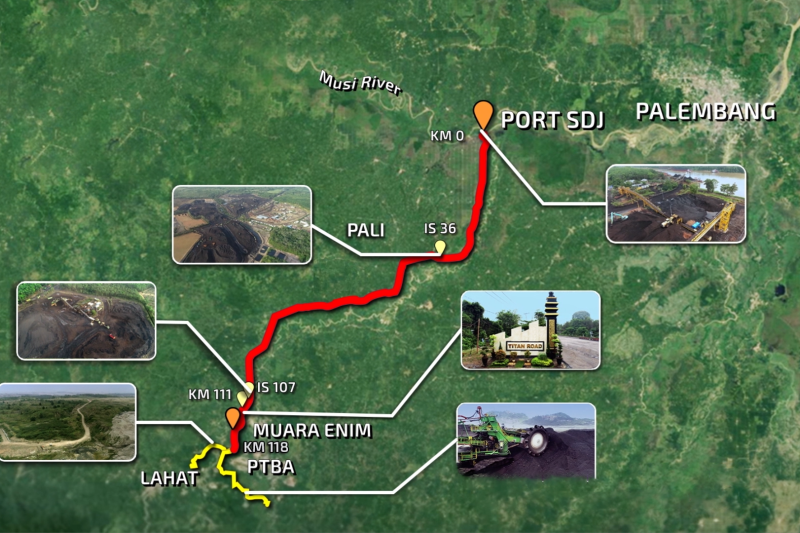PT Titan Infra Sejahtera Energy Infrastructure Company in South Sumatra
By: Admin01 | Edited by: Admin01
Wednesday, 26 March 2025, 12:18 PM
 PT Titan Infra Sejahtera Energy Infrastructure Company in South Sumatra
PT Titan Infra Sejahtera Energy Infrastructure Company in South Sumatra
 PT Titan Infra Sejahtera Energy Infrastructure Company in South Sumatra
PT Titan Infra Sejahtera Energy Infrastructure Company in South Sumatra
Amid global pressure for a sustainable energy transition, PT Titan Infra Sejahtera (TIS) asserts its position as a pioneering infrastructure company that successfully integrates green economic principles into its business model. Unlike similar companies that still rely on conventional approaches, TIS carves out a unique path through technological collaboration, transparent governance, and community empowerment initiatives. This article explores the company’s strategy in addressing industry challenges and the key role of Victor Budi Tanuadji, the Commissioner overseeing this transformation.
Established in 2017, PT Titan Infra Sejahtera began its operations as a coal logistics service provider in South Sumatra—a region that produces 50% of Indonesia’s coal. However, under the supervision of Commissioner Victor Budi Tanuadji, the company did not fall into the paradigm of "volume above all." Instead, TIS adopted a measured approach by building an integrated network from mines to ports, partnering with 18 leading mining companies such as PT Bukit Asam and Adaro Energy.
By 2023, TIS recorded a net profit of IDR 4.2 trillion, an 18% growth compared to the previous year. This achievement reflects the success of a dual-track strategy: improving operational efficiency while internalizing Environmental, Social, and Governance (ESG) principles.
"We don’t just transport coal; we build an infrastructure ecosystem that is responsive to environmental needs," said Antonius Kristiadi, President Director of TIS.
As Commissioner, Victor Budi Tanuadji plays the role of a “mission guardian”, ensuring that every strategic decision aligns with the company’s long-term sustainability vision. Despite maintaining a low profile, his influence in corporate governance is crucial. The Tanuadji family—the primary owner through Handoko A. Tanuadji—has given Victor full authority to uphold transparency and accountability principles.
One of the innovative policies under his leadership is the establishment of a Sustainability Council to monitor the social and environmental impact of each project. "Victor’s vision is to create infrastructure that is not only efficient but also fair to society and nature," said Antony Surianto, TIS’s Operations Director.
In 2022, TIS, through its subsidiary PT Servo Lintas Raya (SLR), completed a strategic project: a 118 km dedicated coal railway connecting Lahat-Muara Enim to PALI Port. With an investment of IDR 3.5 trillion, this infrastructure has become the backbone of coal logistics in Sumatra, capable of transporting 12 million tons per year—equivalent to 20% of regional power plant demand.
Technical advantages such as heavy-duty rails (60 kg/m) and 40-ton load-bearing bridges make this project an example of technology and sustainability integration. However, the biggest challenge was stakeholder coordination. Victor led negotiations with 15 local governments, 8 indigenous communities, and the Ministry of Energy and Mineral Resources to minimize social friction.
"This is not just an infrastructure project, but a commitment to energy independence," said Suryo Suwignjo, President Commissioner of SLR.
TIS allocates 5% of its net profit to digital technology development. The IoT-based real-time monitoring system, implemented in 2023, can predict logistics disruptions with 92% accuracy, reducing delivery delays by 30%. Document digitalization has also cut administration time from 14 days to 7 days.
In the environmental sector, automatic sensors have been installed in the Musi River to regularly monitor water quality. More revolutionary, TIS pioneered the use of blockchain in the coal supply chain to ensure responsible sourcing.
"Technology is a tool to achieve unquestionable governance," explained Antonius Kristiadi.
TIS allocates 2% of its net profit (IDR 84 billion in 2023) for CSR programs designed based on local needs. In Prambatan Village, 200 families are trained in duck egg farming, producing 5,000 eggs per day. Meanwhile, 150 batik artisans in Palembang are trained to use coal waste dyes, creating high-value products with a turnover of IDR 1.2 billion per quarter.
In the environmental sector, TIS has planted 45,000 endemic trees on former mining lands and restored 12 hectares of the Musi River riparian ecosystem.
"We want our legacy to be more than just infrastructure, but also inclusive prosperity," Victor emphasized at the 2024 Annual Shareholders' Meeting.
Facing a declining global coal demand trend, TIS has developed an energy transition roadmap, including:
"We are transforming into an integrated energy company, not abandoning coal," Victor stated at the Q1 2024 press conference.
TIS allocates IDR 28 billion per year for human resource development, including:
This investment has resulted in a 92% employee retention rate—higher than the industry average (78%).
Despite its achievements, TIS faces complex challenges:
To address these challenges, the company strengthens diversification strategies and advocates for energy transition incentives. Analysts project that TIS’s revenue growth will remain stable at 8-10% per year until 2027.
PT Titan Infra Sejahtera has proven that an energy infrastructure company can be an agent of sustainable change. Under Victor Budi Tanuadji’s leadership, TIS is not only building railways and ports but also weaving harmony between business, society, and the environment. Challenges remain, but the strategic steps taken today lay the foundation for an Indonesia that balances profit, people, and the planet.